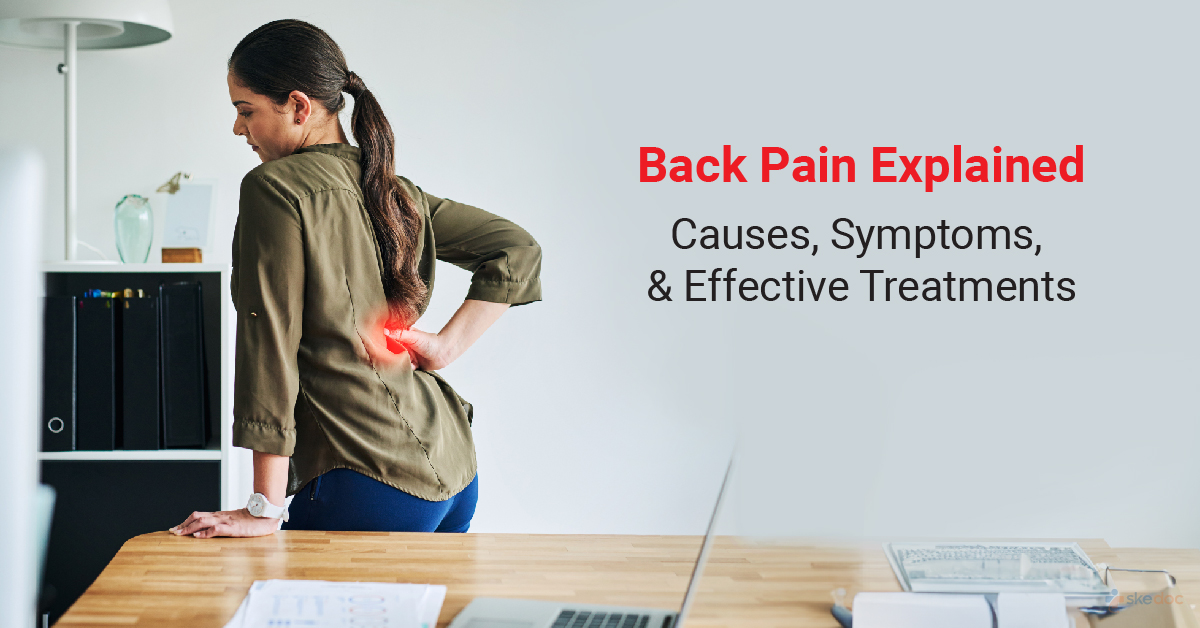Allergy
Blood Diseases
Bone & Joints
Brain
Cancer
Child Care
Cosmetic Surgery
Diabetes
Endocrinology
ENT
Eye
Gen Medicine
General Surgery
Heart
Kidney
Lifestyle
Liver & Digestive
Lung
Men’s Health
Mental health
Physiotherapy
Rheumatology
Skin and hair
Sleep Disorders
Spine
Transplant
Women Health
Thyroid
Vascular Surgery
Back Pain

What is Back Pain?
Back Pain, also known as backache, is the pain that is felt anywhere in the region extending between the top of the buttocks and the back of the neck and shoulders. It is a condition that affects most people at some point in their lives and is a common cause of disability and reduced quality of life.
Is back pain a medical emergency?
Back pain is not a medical emergency.
Types
It may be classified depending on the section of the back that is affected as follows:
- Neck or cervical pain
- Mid or thoracic pain
- Lower or lumbar pain - This is the most commonly seen back pain.
- Coccydynia or tailbone or sacral pain
Based on the duration of the pain, backache may be:
- Acute - Lasts less than 6 weeks.
- Sub-acute - Lasts between 6 weeks to 12 weeks.
- Chronic - Lasts for more than 12 weeks.
Causes
Most of the complaints of backache are due to non-specific causes, while in a few cases, the pain might be due to an internal cause and the involvement of nerves, bones, and soft tissues.
Some of the causes include:
- Non-specific causes - In over 90% of the cases
- Vertebral Compression fractures - 4% of the cases
- Ruptured or bulging discs
- Metastatic cancer - <1%
- Infections of the spine - Such as spinal osteomyelitis or abscess
- Muscle or ligament strain
- Arthritis
- Osteoporosis
- Skeletal Irregularities or deformities
- Cauda equina
- Referred pain from internal organs such as kidney, urinary bladder, pancreas
- Low backache of pregnancy
Risk factors
Some of the risk factors for development include:
- Age - The risk of developing backache increases with increasing age
- Smoking
- Lack of exercise and a sedentary lifestyle
- Obesity
- Poor posture
- Improper lifting of weights
- Illness or medical conditions such as arthritis, cancer, etc.
Triggering factors
Trauma, weather changes, or sudden jerky movements can sometimes trigger backache.
Signs & symptoms
Symptoms and signs may include one or a combination of the following:
- Muscle pain and soreness
- Intense shooting or stabbing pain or dull pain
- Pain travels to either the buttocks, legs, neck, and shoulders
- Pain that worsens when bending, moving, or lifting weights
- Pain that lessens with rest
Investigations
Some of the investigations that may be done include:
- Laboratory tests, including blood tests: To evaluate the presence of infections or other conditions that could be causing the pain.
- Imaging tests:
- X-rays
- CT scan
- MRI
- Bone scans - to evaluate the presence of bone tumors or compression fractures.
- Nerve conduction tests/electromyography (EMG) to evaluate the presence of any nerve compression.
Diagnosis
The diagnosis of backache and the evaluation of its cause are done with the help of medical history, clinical evaluation, and results of the investigations done.
Treatment options
The management of backache is aimed at treating the underlying cause, providing relief from the symptoms, and restoring activity. It may involve self-care, physical therapy, medication, and surgical intervention is required.
Medical management
The medical management of the back may include the following:
- Over the counter analgesics - To provide relief from backache.
- Muscle relaxants - For moderate to severe backache
- Topical pain relievers
- Opioid analgesics - For severe pain that is acute backache or sub-acute backache
- Tricyclic antidepressants - For chronic backache
- Spinal (Epidural) injections - For that has not responded to other medication.
Interventional including surgery and indications for surgery
Surgical intervention may be required for certain conditions that affect the spine, such as spinal trauma, disc compression, etc.
Surgical procedures may include:
- Discectomies
- Disc replacement surgeries
- Spinal fusion surgeries
Role of Diet/ Exercise/ Lifestyle changes/ Preventive measures
Physical therapy can play an important role in the management of backache and may include:
- Heat therapy - Useful in back spasms
- Ultrasound stimulation of muscles
- Electrical stimulation of muscles
- Muscle strengthening and stretching
- Regular physical exercise
Other lifestyle changes that can help to prevent backache are:
- Cessation of smoking
- Maintaining an ideal body weight
- Regular exercise that helps to build muscle strength and flexibility
Complications
Impaired quality of life and poor mobility are the most major complications.
Prognosis
The prognosis for backache is generally good, and in cases where the underlying cause is cancer or a metastatic tumor, the prognosis is usually poor.
When to contact the doctor or hospital? / How to identify the emergency or complications?
It is advisable to seek medical attention if the symptoms are present or if the pain is continuing to worsen despite therapy.
Indications for hospitalization if required
Hospitalization is usually not required but may be needed if surgical intervention is required.
Suggested clinical specialist/ Departments to consult for this condition
Backache may be attended to initially by a family physician and subsequently by a neurologist, orthopedist, physical therapist, and spine surgeon.
Was this article helpful?
YesNo
Comments





